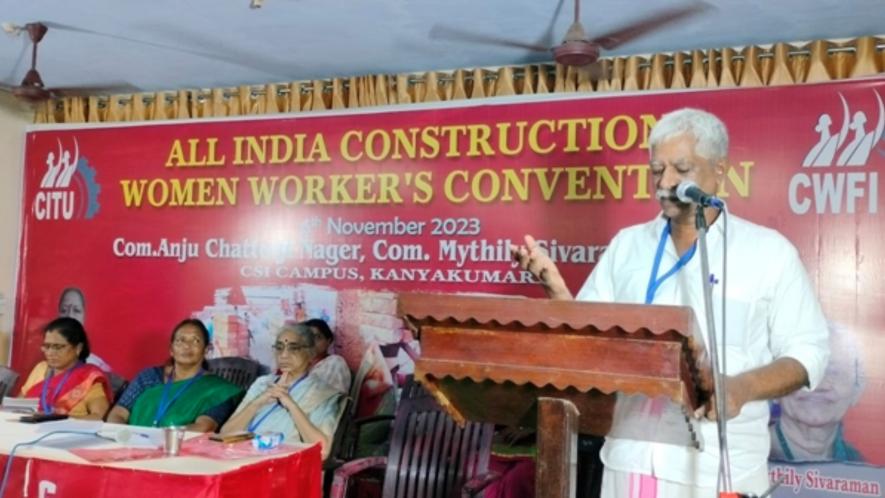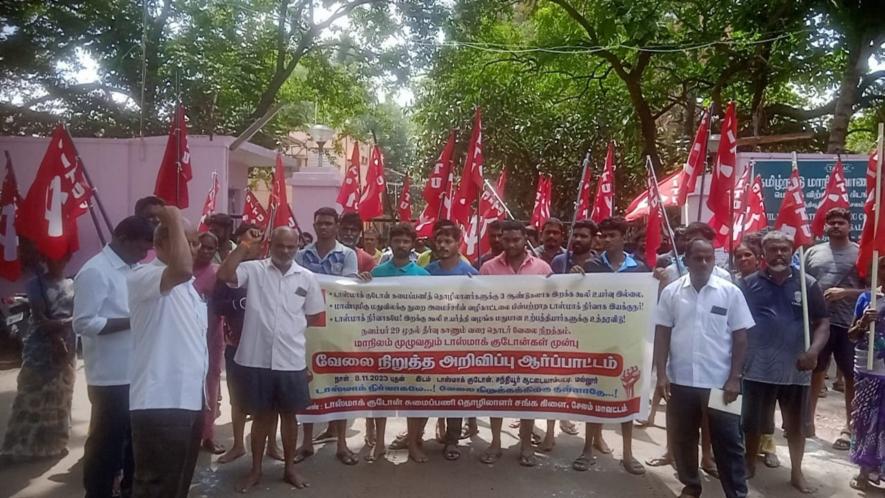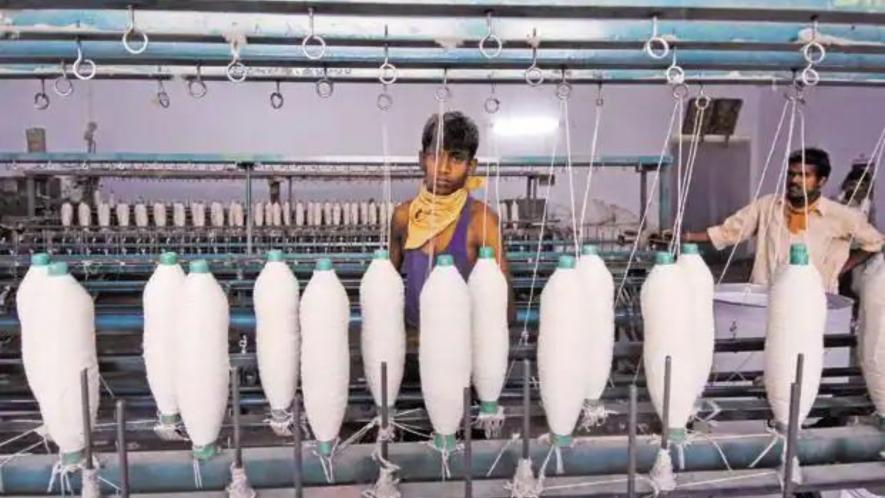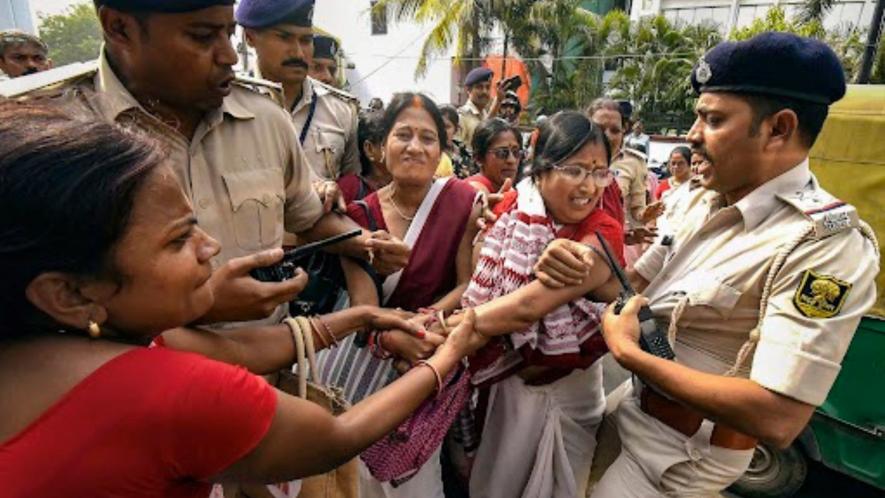Seoul Metro workers stage “warning strike” over planned layoffs
The management of Seoul Metro has used losses over the past few years as a reason behind laying off over 2,200 workers, while trade unions argue it will affect safety standards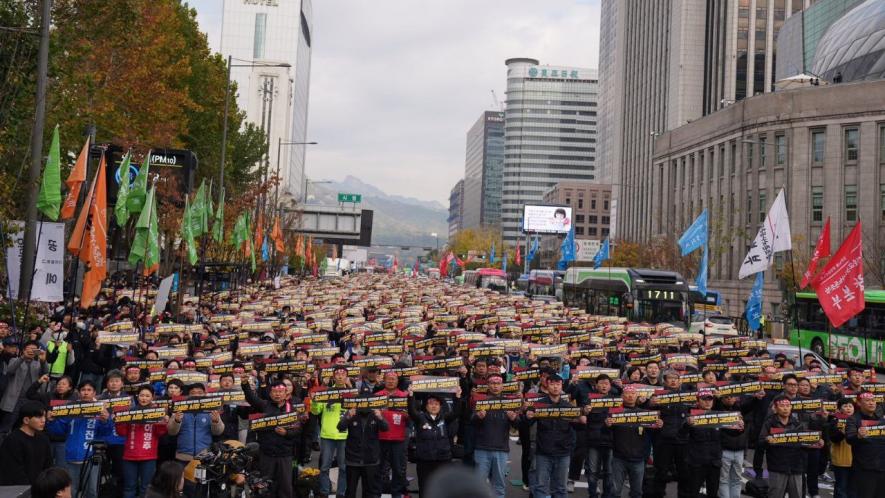
Thousands of workers organized by the KPTU rallied near the Seoul City Hall, launching the two-day strike. (Photo: KPTU)
On Thursday, November 9, over 10,000 workers at Seoul Metro began their two-day strike action against plans by the rail operator to lay off an estimated 2,212 employees, or 13.5% of the total workforce, by 2026. Of these, 383 workers are set to be terminated by the end of 2023 alone.
Over 7,000 workers participated in a massive rally at the Daehanmun Gate near the Seoul City Hall, launching the strike.
Seoul Metro or Seoul Transportation Corporation, a publicly-owned enterprise under the Seoul Metropolitan Government, operates Lines 1 to 8 in the Seoul subway network and part of Line 9. Serving over 7 million million passengers daily, it is the biggest subway operator in the city.
The company has been claiming operational losses over the past few years and a total deficit of KRW 18.4 trillion (or USD 13.9 billion) to justify the planned lay-offs. But trade unions have argued that the lay-offs will only affect safety of the subway at a time when a batch of retiring workers will leave behind a vacuum of on-site safety workers.
Negotiations with trade unions representing the more than 16,000 metro workers have failed to yield results. The trade unions have also noted that 276 vacancies are left behind by retiring workers, and demanded at least 771 new workers this year alone, instead of the proposed workforce cuts.
“The safety of the people and subways will be threatened by the reduction of the workforce and outsourcing of safety work,” said Myung Soon-pil, chairman of the Korean Public Service and Transport Workers’ Union (KPTU). The KPTU is the largest of the three unions in the Seoul Metro network, representing over 10,000 workers. It is affiliated to Korean Confederation of Trade Unions (KCTU).
“Following the plan of the Seoul Metro, a vacuum in on-site safety personnel will be inevitable from January next year. Given that the recruitment process takes four to five months, we should hurry up with the recruitment right now,” said Myung.
“The comrades requested safety personnel to ensure that the Kim incident at Guui Station and the Sindang Station disaster never happen again,” said Hyun Jeong-hee, a leader of the KPTU, addressing the rally at Seoul City Hall.
Hyun was referencing the death of a 19-year old irregular metro worker in Guui Station in 2016 and the gruesome murder of a female worker in Sindang Station in 2022, to highlight the precarious and unsafe working conditions that Metro employees are put under.
Last minute negotiations broke down earlier this week to avoid strike, after the operator refused to fill in the upcoming vacancies. Following failed negotiations the KPTU went ahead with the “warning strike.”
In the last minute deal, the management has so far only offered to add 660 new recruits this year, with no commitments on the over 2,200 workers set to be laid off in the coming years. All three unions rejected the deal.
Unions have also warned of a general strike later this month if the Seoul Metro management and the conservative People Power Party (PPP)-led Seoul city government continue to disregard workers’ demands. The trade union however stated that the general strike, if needed, will be held after November 16, the day of nationwide college entrance exams.
Courtesy: peoples dispatch

Thousands of workers organized by the KPTU rallied near the Seoul City Hall, launching the two-day strike. (Photo: KPTU)
On Thursday, November 9, over 10,000 workers at Seoul Metro began their two-day strike action against plans by the rail operator to lay off an estimated 2,212 employees, or 13.5% of the total workforce, by 2026. Of these, 383 workers are set to be terminated by the end of 2023 alone.
Over 7,000 workers participated in a massive rally at the Daehanmun Gate near the Seoul City Hall, launching the strike.
Seoul Metro or Seoul Transportation Corporation, a publicly-owned enterprise under the Seoul Metropolitan Government, operates Lines 1 to 8 in the Seoul subway network and part of Line 9. Serving over 7 million million passengers daily, it is the biggest subway operator in the city.
The company has been claiming operational losses over the past few years and a total deficit of KRW 18.4 trillion (or USD 13.9 billion) to justify the planned lay-offs. But trade unions have argued that the lay-offs will only affect safety of the subway at a time when a batch of retiring workers will leave behind a vacuum of on-site safety workers.
Negotiations with trade unions representing the more than 16,000 metro workers have failed to yield results. The trade unions have also noted that 276 vacancies are left behind by retiring workers, and demanded at least 771 new workers this year alone, instead of the proposed workforce cuts.
“The safety of the people and subways will be threatened by the reduction of the workforce and outsourcing of safety work,” said Myung Soon-pil, chairman of the Korean Public Service and Transport Workers’ Union (KPTU). The KPTU is the largest of the three unions in the Seoul Metro network, representing over 10,000 workers. It is affiliated to Korean Confederation of Trade Unions (KCTU).
“Following the plan of the Seoul Metro, a vacuum in on-site safety personnel will be inevitable from January next year. Given that the recruitment process takes four to five months, we should hurry up with the recruitment right now,” said Myung.
“The comrades requested safety personnel to ensure that the Kim incident at Guui Station and the Sindang Station disaster never happen again,” said Hyun Jeong-hee, a leader of the KPTU, addressing the rally at Seoul City Hall.
Hyun was referencing the death of a 19-year old irregular metro worker in Guui Station in 2016 and the gruesome murder of a female worker in Sindang Station in 2022, to highlight the precarious and unsafe working conditions that Metro employees are put under.
Last minute negotiations broke down earlier this week to avoid strike, after the operator refused to fill in the upcoming vacancies. Following failed negotiations the KPTU went ahead with the “warning strike.”
In the last minute deal, the management has so far only offered to add 660 new recruits this year, with no commitments on the over 2,200 workers set to be laid off in the coming years. All three unions rejected the deal.
Unions have also warned of a general strike later this month if the Seoul Metro management and the conservative People Power Party (PPP)-led Seoul city government continue to disregard workers’ demands. The trade union however stated that the general strike, if needed, will be held after November 16, the day of nationwide college entrance exams.
